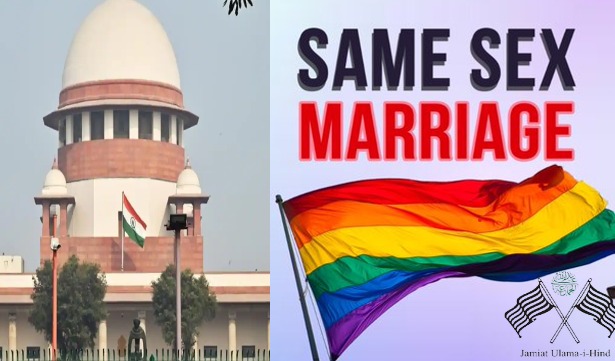
Jamiat Ulama-i-Hind has recently sought intervention in the matter pertaining to the legal recognition for same-sex marriage in India. While opposing the petitions seeking to fit in same sex marriage in the prevailing legal regime of India, Jamiat Ulama-i-Hind has argued that as a legal institution, marriage between the opposite sexes has been central to the legal regime of India.
The intervention application filed by the organization contends that the concept of marriage is more than just the socio-legal recognition of a union of “any two persons,” and that its recognition is based on established societal norms that cannot be changed on the basis of variable notions based on newly developed value system emerging from a different worldview.
“It is submitted that marriage between the opposite sexes has been central to the legal regime of a country like ours as a legal institution. We have numerous statutory provisions ensuring marriages between opposite sexes, as well as associated law provisions relating to inheritance, succession, and tax liabilities arising from marriage. As a result, marriage between two opposite sexes is a basic feature of the concept of marriage itself that leads to the creation of a bundle of rights,” it stated.
The application claims that petitions seeking same-sex marriage recognition are diluting the idea of marriage, which is a “stable institution,” by introducing a “free-floating system,” which is same-sex marriage.
The application contends that because countries that have legalised same-sex marriages have achieved a certain level of social order in terms of education/literacy and societal acceptance, the concept of same-sex marriage cannot be introduced in India.
It stated, “It is also worth noting that most Eastern nations do not recognise “same-sex marriages”.
The application also relies on different religions to argue that same-sex marriage cannot be allowed.
It claims that “Marriage is defined among Hindus as a religious sacrament in which a man and a woman are bound in a permanent relationship for physical, social, and spiritual purposes of dharma, procreation, and sexual pleasure Hindus marry for spiritual growth rather than for physical pleasure or procreation. It is one of the sixteen sanskars.”
Similarly, it argued that the prohibition of homosexuality in Christianity and Islam has been categorical since the beginning of these religions itself.
It added, “A study of the Islamic paradigm regarding gender and sexuality in Islamic law and theology reveals a clear and fixed principle of only two genders (biological). If we follow the epistemology of Western sexual freedom movements, we find that the defining figures are almost all avowed atheists. Because the atheistic worldview has had a decisive impact on current changes in sexual morality ideas, it must not be allowed to establish any space within religiously governed personal laws of communities.”
The petitions concerning the legality of same-sex marriages are scheduled for final disposition and hearing before a Constitution Bench on 18 April, 2023.




